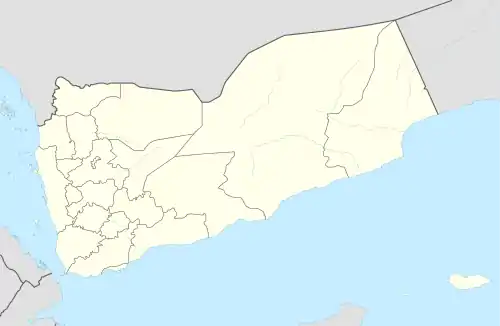| Aden Expedition | |||||||||
|---|---|---|---|---|---|---|---|---|---|
| Part of Conquest of Aden | |||||||||
 Contemporary painting showing British warships engaging Sira fortress batteries | |||||||||
| |||||||||
| Belligerents | |||||||||
|
|
| ||||||||
| Commanders and leaders | |||||||||
|
|
| ||||||||
| Strength | |||||||||
|
Land: 700 infantry[1] Sea: 1 frigate 1 corvette 1 brig 1 schooner |
700 infantry 33 artillery pieces 1 fort | ||||||||
| Casualties and losses | |||||||||
|
None 1 corvette damaged |
150 killed or wounded 139 captured 33 artillery pieces captured 1 fort captured | ||||||||
 Aden Expedition Location within Yemen | |||||||||

Cannon made in 1531 for the Ottoman invasion of India and captured at Sira by the Royal Navy in 1839, now in the Tower of London.
The Aden Expedition was a naval operation that the British Royal Navy carried out in January 1839. Following Britain's decision to acquire the port of Aden as a coaling station for the steamers sailing the new Suez-Bombay route, the sultan of Lahej, who owned Aden, resisted, which led to a series of skirmishes between the two sides. In response to the incidents, a small force of warships and soldiers of the East India Company were sent to Arabia. The expedition succeeded in defeating the Arab defenders, who held the fortress on Sira Island, and occupied the nearby port of Aden.[2][3]
Order of battle
Royal Navy:
- HMS Volage, frigate (28 guns)
- HCS Coote, sloop (18 guns)
- HMS Cruizer brig (18 guns)
- HCS Mahi, schooner (5 guns)
References
- ↑ "Seizure of Aden 1839 - FIBIwiki".
- ↑ Clowes, pg. 277-279
- ↑ Playfair, pg. 162-163
Bibliography
- Clowes, William (1901). The Royal Navy: A history from the earlierst times to the present Volume VI. London, England: William Clowes & Sons.
- Playfair, Robert L. (1859). A history of Arabia Felix or Yemen, from the commencement of the Christian era to the present time: including an account of the British settlement of Aden. Education Society's Press.
See also
This article is issued from Wikipedia. The text is licensed under Creative Commons - Attribution - Sharealike. Additional terms may apply for the media files.